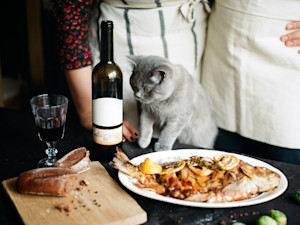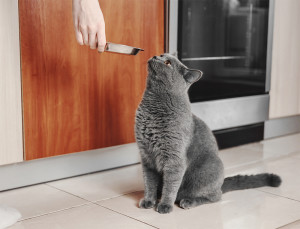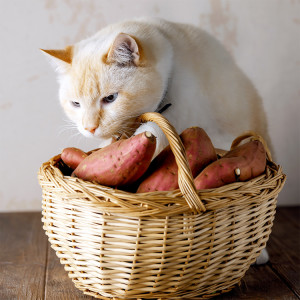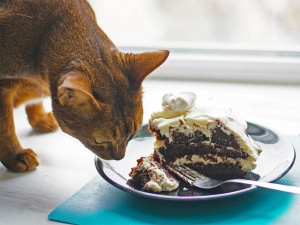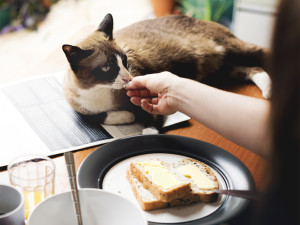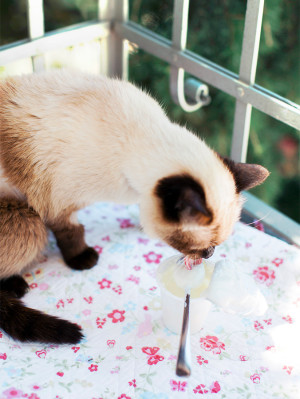What Can Cats Eat Besides Cat Food?
Good news for your begging cat: Some of your favorite snacks are safe to share.
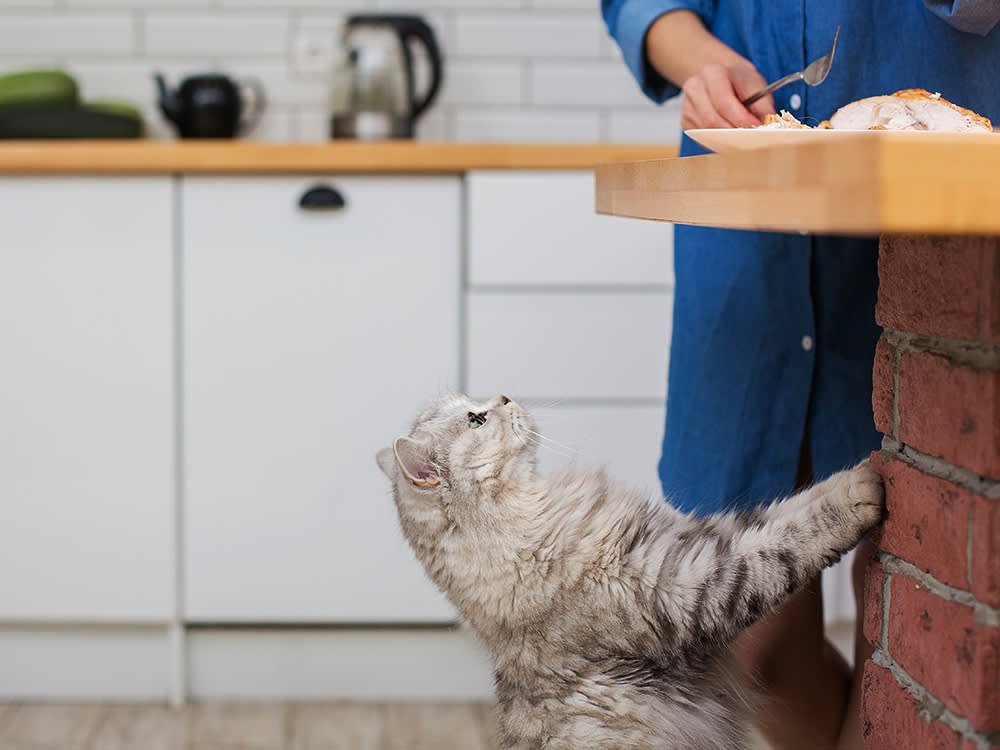
Share Article
In This Article:
10 Safe Human Foods for Cats Human Foods to Avoid Feeding Cats
Admit it: Your cat helps clean your plate. Slipping them some pizza or letting them slurp up the leftover milk in your cereal is harmless, right? Um, maybe.
Dr. Tina Wismer, senior director of toxicology for the ASPCA Animal Poison Control Center, notes that there are some people foods that are safe for cats to eat in addition to their regular diet. But you have to choose wisely. Note: The sodium-laden takeout that tastes oh-so-good is not on the safe list.
Here are 10 human foods that are safe to share with your cat.

10 safe human foods for cats
1. Broccoli
Broccoli is loaded with antioxidants and fiber that promotes good digestive health. Although raw broccoli is safe for cats, the cruciferous veggie might be hard for them to chew, so consider steaming it to make it easier. You might prefer broccoli covered in cheese sauce, but cats should eat it plain, Dr. Wismer advises.
2. Cantaloupe
Cantaloupe and other melons contain some of the same amino acids that are found in meat, creating similarities between the scents of meat and melon. Even if they know the difference between a hunk of meat and a slice of melon, your cat may still enjoy the taste.
Cantaloupe is safe in small quantities, so grab the melon baller and start scooping some fleshy fruit for your feline. “Cutting harder fruits into bite size pieces is advisable,” Dr. Wismer says. “Remove any seeds, cores, stems or peels [from fruit].”
3. Carrots
Both raw and cooked carrots are fine for cats. The veggies are a good source of fiber but remember, cats aren’t vegetarians, so offer carrots — and other fruits and vegetables — in moderation. Dr. Wismer also offers a note of caution: “It’s best to cut vegetables into small bite size pieces to avoid any choking hazards.”
4. Chicken
Cats are obligate carnivores who need animal proteins in their diet, and chicken is often a staple. Small amounts of cooked chicken are safe as long as it’s boneless; it should also be plain with no added seasonings. Dr. Wismer suggests sticking with chicken breasts, not deli meat. The deli versions are often high in sodium; too much salt can increase thirst and lead to vomiting, diarrhea, and even seizures.
5. Fish oil
Adding fish oil to your cat’s diet could help boost skin and coat health. The supplement is chock full of omega-3 fatty acids that are found in cold water fish, like tuna and salmon. Too much fish oil can cause stomach upset, so ask your vet about the right dose for your cat.
6. Green beans
For a snack that’s low in calories, high in fiber, and offers a little more protein than other vegetables, it’s green beans for the win. Cats can eat raw or cooked green beans as long as there are no seasonings or oils added during cooking. Substituting green beans for other treats might even help overweight cats shed excess pounds.
7. Pumpkin
It’s not just for pumpkin spice lattes. Pumpkin is a good source of insoluble and soluble fiber (and vets often recommend offering it to cats for constipation). Stick with plain, canned pumpkin. It’s cooked and that makes it easier to digest; save the spiced pumpkin for your seasonal pies.
8. Salmon
There’s a good reason salmon is one of the main ingredients in many commercial cat foods: The fatty fish is high in nutrients like protein and omega-3 fatty acids. Stick with fresh (and cooked) salmon; the canned, smoked or cured varieties tend to be high in salt, which can cause health issues.
9. Sardines
Sardines are another fish healthy for cats because they’re one of the richest sources of omega-3, vitamin D, and vitamin B-12 — which are great for joint and heart health, allergies, and weight loss, especially in senior cats. They also contain DHA, which supports cognitive learning and motor skills. Just be sure to drain the can of any added oils, sauces, or brine.
10. Turkey
Like chicken, turkey is a lean, high protein option that’s safe for cats. It’s ok to give your cat small amounts of turkey, but Dr. Wismer notes that it should be boneless and cooked without any seasonings; deli turkey, which is high in sodium, is not a good substitute.
If you’re offering your cat a few foods from the refrigerator, keep portion sizes small. Extras like salmon and green beans might be healthy and safe, but they aren’t a replacement for cat foods that were formulated to provide the right balance of nutrients for your cat’s health and wellbeing. Dr. Wismer suggests treating these foods as treats, noting that human foods shouldn’t make up more than five percent of your cat’s diet.
“Be mindful that too much of a food your pet is not used to can lead to some digestive upset,” she says. “Pets should get most of their nutrition from their regular diets.”
Human foods to avoid feeding cats
Although there are lots of great shareable options, some human foods should stay off a cat’s plate.
Toxic foods
Some foods are major no-nos for cats. Cats should absolutely never eat chocolate. Garlic is extremely toxic for cats and can sometimes be fatal. Grapes and raisins are dangerous for cats and can cause kidney failure. Always check to see whether a food is toxic for cats before sharing from your plate; it’s also best to ask a veterinarian before substantially changing your cat’s diet.
High-fat and spicy foods
High-fat foods like avocado aren’t all necessarily toxic for cats, but they should be avoided because they can lead to gastritis, pancreatitis, or an upset stomach. Plus, foods high in fat can contribute to feline obesity, which can increase a cat’s risk for other health issues. “Remember that animals that maintain at a healthy weight throughout their lifetime can live an additional two years over that of an overweight pet,” Dr. Lori Teller told us.
Cats should also stay away from spicy foods. All spicy food can cause gastrointestinal upset, oral irritation, eye irritation, and a runny nose for cats; plus, many spicy foods contain capsaicin, which can lead to serious symptoms such as swelling, stomach upset, and difficulty breathing.
Sugary and processed snacks
Like fatty foods, sugary foods can contribute to feline obesity, so they should be avoided. A diet that’s high in sugar can also cause cats to develop diabetes. Sugary and processed snacks should be kept away from your cat.
Alcohol and caffeine
Alcohol — all kinds, whether it’s wine or liquor or beer — is extremely toxic to cats because it contains both ethanol and grain. Just one teaspoon of alcoholopens in new tab is enough to seriously harm a cat. Alcohol poisoning can cause nausea, seizures, paralysis, and more dangerous symptoms.
Caffeine should also be kept far away from cats. Caffeine can increase a cat’s heartrate and cause hyperactivity. In extreme cases, caffeine can lead to cardiac arrhythmias, raised blood pressure, vomiting, tremors, and seizures.
FAQs (People also ask)
What fruits and veggies can cats eat?
Cats can eat a variety of fruits and veggies, including apples, blueberries, strawberries, watermelon, pumpkin, banana, cranberries, cucumber, broccoli, asparagus, and peas.
What are safe human foods for cats?
While some foods are toxic for cats, other human foods are safe for cats to eat. Some safe human foods include salmon, chicken, cantaloupe, broccoli, turkey, sardines, and more.
Is it safe for cats to eat dog food?
In a pinch, yes; most dog food won’t hurt a cat. But cats can’t eat dog food long-term. Cat food contains added proteins and vitamins that aren’t in dog food, because cats are obligate carnivores. And any change in a cat’s diet can cause digestive upset.
References:
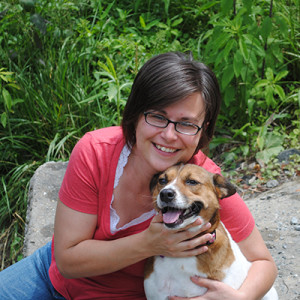
Jodi Helmer
Jodi Helmer is a North Carolina-based freelance writer who shares her home with an embarrassing number of rescue dogs and relies on four feral cats to patrol the barn. When she isn’t refilling food and water dishes, Jodi writes about animals for Scientific American, Sierra, WebMD, AKC Family Dog, Living the Country Life, and Out Here.

Sio Hornbuckle
Sio Hornbuckle is the Assistant Editor at Kinship, where they frequently write for the site. As a writer, they specialize in pet news, animal science, and pop culture. They live in New York City with their cat, Toni Collette.
Related articles
![Cat eating out of metal bowl]()
Top 10 Foods That Are Toxic to Cats
Sharing isn’t always caring. Keep your cat safe by keeping these human snack staples to yourself.
![Hand holding food bowl peeks into frame as a cat looks up expectantly]()
The Ultimate Puzzle: Picking the Right Cat Food
Four veterinary nutritionists pick apart the claims so that you can choose the right food for your kitty.
Can Cats Eat Sweet Potatoes?
Yep—but the plainer, the better. Here’s why.
Can Cats Eat Chocolate?
No, no, no. Absolutely not. Here’s why.
![Woman feeding her cat buttered toast for breakfast.]()
Can Cats Eat Butter?
Butter isn’t toxic to your cat—but despite what they tell you, they really shouldn’t eat it.
Can Cats Eat Yogurt?
A small amount is fine—but keep a close eye on the ingredients list.

